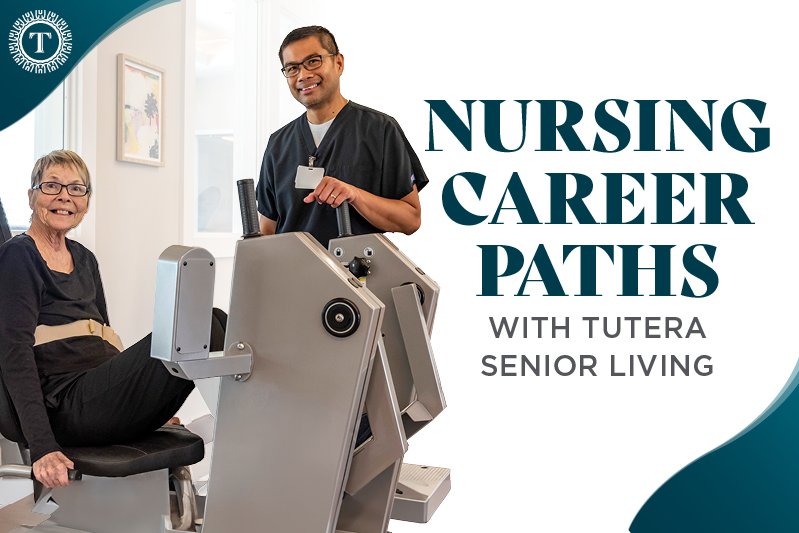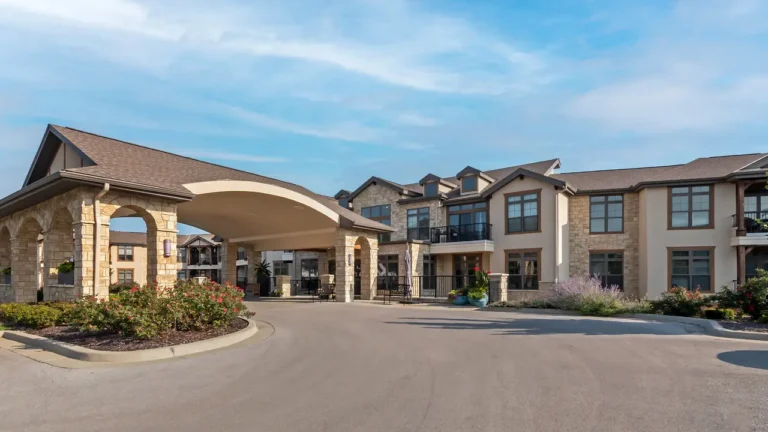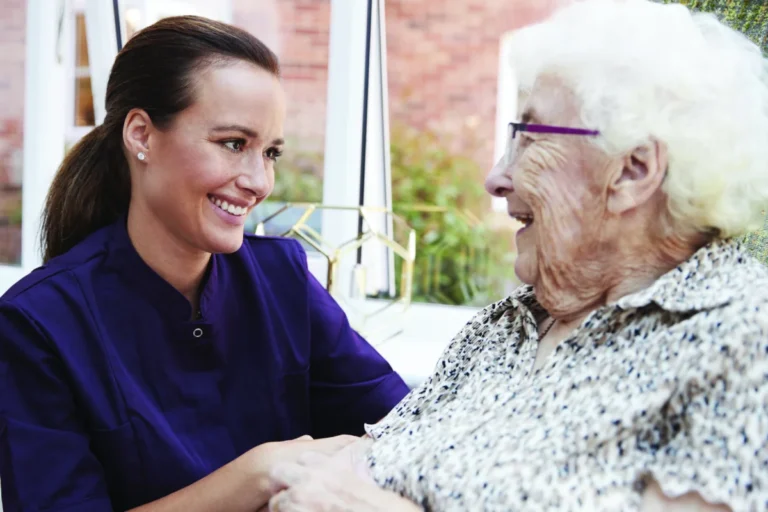In senior living communities, every team member plays an important role in the lives of residents and typically has daily interactions with them. However, no group connects more consistently or meaningfully with residents than the nursing staff, and at Tutera Senior Living, there are many nursing career paths that can lead to career advancement and satisfaction.
These dedicated professionals are often the heartbeat of the community, offering not only medical care but also emotional support, companionship and a sense of safety. The blog below dives deeper into the different types of nursing staff you’ll find in a senior living setting and how their specialized care makes a lasting impact on residents’ quality of life.
Importance of Nursing Roles in Senior Living Communities
The variety of nursing roles – each with unique responsibilities and skill sets – ensures that residents receive comprehensive, around-the-clock care. From Licensed Practical Nurses (LPNs) and Registered Nurses (RNs) to Certified Nursing Assistants or Certified Nurse Aides (CNAs) and Medication Aides, each team member contributes to the physical and emotional well-being of residents.
Within communities, there are many opportunities and roles for nurses. From helping with activities of daily living with assisted living residents to the specially trained nurses who work with memory care residents to the nursing staff who get people back on their feet through skilled nursing recovery services, nurses are an integral part of each community.
Nurses in senior living environments serve as the cornerstone of holistic care, addressing the physical, emotional and social needs of residents. Clinical nurses ensure medical needs are met through medication management, symptom monitoring and chronic disease care, while fostering trust through compassionate interactions that reduce anxiety and improve treatment adherence.
Assisted living nurses take this further by designing personalized care plans, assisting with daily activities and advocating for residents’ dignity, ensuring each individual’s autonomy and preferences remain central to their care journey. Specialized nurses in areas like memory care or rehabilitation provide targeted support for conditions such as Alzheimer’s or post-surgical recovery, adapting care strategies to evolving needs. Together, these nursing roles create a seamless support system that prioritizes safety, comfort and emotional well-being, directly enhancing residents’ quality of life.
Certified Nursing Assistant or Certified Nurse Aide
A Certified Nursing Assistant or Certified Nurse Aide (CNA) is a health care professional who provides support to residents under the supervision of registered nurses and other medical staff. CNAs often come to senior living communities in an entry-level role, which often serves as a stepping stone to higher-level nursing roles. Certified nursing assistants help with many aspects of resident care, including:
- Assistance with activities of daily living (ADLs), such as bathing, mobility and toileting
- Monitoring of vital signs, such as blood pressure and temperature
- Providing emotional companionship and support
- Reporting changes in resident health conditions
Certified nursing assistants complete a state-approved training program, which can be completed in a matter of months. Once they have completed the training program and passed a state exam, they are placed on a state nurse aide registry and are able to work with patients and residents at senior living communities and rehabilitation centers.
Licensed Practical Nurse
A Licensed Practical Nurse (LPN) is a health care professional who provides basic medical care under the supervision of registered nursing staff and physicians. While their responsibilities may vary, their tasks generally include:
- Assistance with activities of daily living (ADLs), such as bathing, mobility and toileting
- Monitoring of vital signs, such as blood pressure and temperature
- Basic medical procedures, such as wound care and starting IVs
- Documenting resident medical histories, updating medical records and reporting changes in health conditions
Much like CNAs, LPNs complete a state-approved training program, which lasts about a year. In addition to this training, they must pass the NCLEX-PN exam for their Licensed Practical Nurse license and a state-specific Licensed Practical Nurse license to practice in their state. Often, LPNs act as mentors and supervisors for CNAs, offering valuable insight into their positions and training methods.
Registered Nurse
Registered Nurses (RNs) are health care professionals who provide direct support to residents, act as an advisor and liaison between physicians and staff and much more. Responsibilities encompass clinical care, health monitoring and administrative duties.
Completing health care tasks and expanding on the actions of both CNAs and LPNs, the RN is responsible for:
- Comprehensive health assessments and physical exams
- Administering medications, preparing IVs, drawing blood and managing treatments
- Monitoring changes in residents’ health
- Developing individualized care plans based on past and current health needs
- Educating residents on managing conditions
- Promoting wellness initiatives
- Advocating for resident safety and welfare
In addition, RNs supervise CNAs and LPNs, delegate assignments, assign work schedules and ensure highest standards of care. They also communicate with families about changes in the residents’ personalized care plans. To become a Registered Nurse, individuals need to obtain an associate’s degree in nursing or a bachelor’s degree in nursing and pass the state’s NCLEX-RN exam to receive licensure in the state.
Director of Nursing
The Director of Nursing (DON) plays a vital leadership role within senior living communities, serving as a cornerstone of the nursing team and ensuring the overall excellence of clinical care. This critical position is responsible for:
- Overseeing the entire nursing department
- Ensuring compliance with all state, federal and local health care regulations
- Managing departmental budgets
- Recruiting, training and developing nursing staff
- Upholding high standards of resident care
Individuals with this position are often seasoned Registered Nurses with extensive hands-on experience. The Director of Nursing is not only a clinical expert but also a mentor, manager and advocate for both residents and staff – ensuring that every aspect of nursing operations aligns with the mission of providing compassionate, dignified and person-centered care.
Advancing to Senior Living Administration
Registered Nurses or Directors of Nursing can leverage their clinical experience to step into administrative roles within a senior living community. Translating this clinical experience includes using firsthand knowledge of care delivery to inform policy development and resource allocation for patients. In addition, they bridge the frontline nursing needs with organizational goals by understanding and implementing operational strategies.
To continue the career development journey to senior living administrative roles, nurses are encouraged to pursue advanced education, such as a Master of Science in Nursing or a Master of Business Administration in management for a focus on mastering organizational leadership.
This education also leans into advanced certifications, such as Nurse Executive or NEA-BC credentials to validate administrative capabilities with specialized training and completed courses in health care leadership roles, regulatory compliance or risk management.
To become a Long-Term Care Administrator, individuals must pass the NAB exam, which is a series of competency-based assessments from the National Association of Long Term Care Administrator Boards (NAB) to license and certify administrators across senior living and health services. This licensing process ensures that entry-level professionals can meet the standards for public protection and competent practice.
The NAB exam certifies a variety of administrator roles, such as:
- CORE Competency
- Long-Term Care Administrator
- Residential Care/Assisted Living
- Home and Community-Based Services
Licensing requirements vary from state to state and depend on what type of long-term care communities individuals will work in.
Tips for Climbing the Nursing Career Ladder
One of the most important pivots from a nursing role to a senior living administrator is a focus on leadership role training and mentoring. As they partner with current nurse administrators to understand strategic plans and interdepartmental collaboration, these individuals must balance both clinical expertise and interpersonal skills to be successful in these positions.
By systematically developing these competencies while maintaining clinical credibility, nurses can position themselves as ideal candidates for administrative roles that require both frontline insight and executive-level strategic thinking.
Here are other ways to prepare yourself for advancing in a nursing career:
- Gain leadership experience by mentoring staff and leading care teams
- Continue education by receiving additional training and certifications
- Network with fellow industry leaders and attend industry conferences
- Stay current with health care regulations
- Get familiar with the business side of care – learn about budgets and human resources practices
For those passionate about elder care, investing in professional growth is both a responsibility and a pathway to leadership roles. Pursuing certifications, advanced training or roles in care coordination equips nurses to address challenges and form solutions in aging populations. By embracing lifelong learning and interdisciplinary collaboration, nurses can redefine senior living standards, ensuring compassionate, person-centered care remains at the heart of this vital profession. The journey not only elevates individual careers but also strengthens the entire ecosystem of senior care nursing, making it an ideal choice for those driven to lead with purpose and empathy.
Nursing Careers at Tutera Senior Living
Advancing in senior care nursing offers profound personal and professional rewards. Specializing in geriatrics or pursuing leadership roles allows nurses to deepen their impact, whether through mentoring others, shaping care policies or improving health outcomes for vulnerable populations.
The growing demand for senior care expertise ensures job security while providing opportunities for continuous learning – from certifications in acute care to advanced degrees that open doors to administrative or educational roles. Tutera Senior Living values nurses as a cornerstone of care in our many communities. Whether you are beginning your career as a CNA, entering the senior living world as a freshly minted Registered Nurse or looking to advance your career as a Long-Term Care Administrator, Tutera has a path for you! We’d love to meet with you and identify the best position and nursing career path for you. To get in touch, click here.







